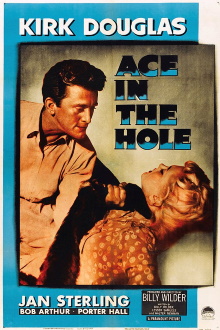Even without deliberately setting out to do so, I’m slowly making a bit of a dent in director Billy Wilder’s filmography. This one isn’t one of his major works but it’s still brimming with energy and feels topical in its critique of the media creating its own news. I was surprised however to learn that it’s partially based on real rescue events that turned into giant media circuses, one of them dating back to the 1920s. I was inclined to be skeptical of the huge crowds shown in the film but apparently that was all too real too.
Chuck Tatum is an aggressive reporter who talks his way into a job at a small newspaper in Albuquerque after being fired from multiple major newspapers. He intends for it to only be a brief stop until he can work his way back up again and ends up staying for a year and there is just nothing of importance happening nearby. His big break comes when, together with a young photographer from the newspaper, he runs across a partial cave-in in some caves formerly inhabited by Native Americans. A local man, Leo, who had been collecting old artefacts from the caves is trapped inside. His wife, Lorraine, runs the trading post nearby and is actually none too upset as she feels trapped in the marriage. Chuck instantly realizes the newsworthiness of the tragedy and sensationalizes it by attributing it to an ancient Indian curse. He talks the local sheriff into cooperating with him by using his articles to boost the sheriff’s reputation as a hero so that he can be reelected. In order to milk the story for as long as possible, they force the engineer to use the slow way of drilling into the cave from the top instead of trying to shore up the existing tunnel even though that puts Leo’s life at risk.
It seems that the theme for this week’s batch of films is that they each have a single core idea and pretty much nothing else. Here it’s all about Chuck hyping up the cave-in and subsequent rescue operation for all that it’s worth. Beginning with a family of tourists who decide to take a detour to the area after reading Chuck’s article about the accident, it burgeons into a huge affair with radio commentators, stage performers and even carnival rides. For a while this film was even titled The Big Carnival. As I said, I was surprised by the sheer scale of the media circus it turns into, complete with people rushing off from a train to take a look, but apparently it’s all partially based on true stories. I suspect that before the era of mass television and of course the Internet, people were a lot more starved for anything new and exciting. Lorraine, after some coaching from Chuck, uses the huge crowds to earn money. Chuck for his part, revels in the exclusive access he gets to the still trapped Leo and the power this gives him over editors and other journalists.
I’d say that this film probably runs a little longer than it needs to be as there is no real pivot to a second act. Kirk Douglas brings incredible energy to his role as Chuck and the dialogue is snappy but it’s still a little difficult to believe how easily he gets his way. It’s also trite how the film uses him drinking more over time as his scheme works to represent his slipping moral standards. As there are no true antagonists and Chuck’s character development is internally directed, the film peters out after a while. It would be more interesting if one of the supporting characters were empowered to more capably resist him.
Overall, this film is too much of a one-note wonder for me to consider it to be a major work. But it is a well-made film and it does succeed in driving its point home. Apparently this was one of Wilder’s rare failures when it was made, but once again its reputation has grown over time.
